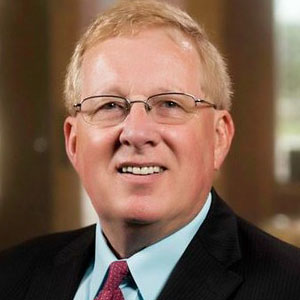Kansas Profile – Now That’s Rural: Norm Conard, Part 2 -- Unsung Heroes
March 4, 2020
By Ron Wilson, director of the Huck Boyd National Institute for Rural Development at Kansas State University.

Unsung heroes. They can take many forms, from a hard-working single parent to an inspirational teacher to your local firefighter or police officer. Today we’ll learn about a Kansas-based educational center which is seeking to share examples of unsung heroes so as to improve our communities and our world.
At right: Norm Conard| Download this photo
Last week we met Norm Conard, a long-time social studies teacher at Uniontown High School. His students did many award-winning history projects through the years, one of which was a play about Irena Sendler. Sendler was a Polish social worker who rescued 2,500 Jewish children from the Nazis during World War II. After the communists overtook Poland, they suppressed her story for another 45 years before Mr. Conard’s students became aware of it.
Three of Mr. Conard’s high school students did a play for National History Day about Irena Sendler. Eventually her story gained national recognition. The unsung heroism of this woman became known to a grateful world.
Having seen the transformative power of this work, Norm Conard thought about how to create more impact. During his teaching career, he was a USA Today All-American Teacher, Kansan of the Year, member of the National Teachers Hall of Fame, and recipient of many other honors.
As he sought to enhance education using these stories of unsung heroes, he developed a grant proposal to the Milken Family Foundation to create an educational center based on this idea. Not only was the grant ultimately approved, Norm retired from teaching to become the center’s executive director.
Today the Lowell Milken Center for Unsung Heroes is located in Fort Scott, Kansas. Its mission is to “transform classrooms and communities through student-driven projects that discover unsung heroes from history and teach the power of one to create positive change.”
The center works with students and educators to develop history projects that highlight role models demonstrating courage, compassion and respect. “It is project-based learning, which allows the students to take ownership,” Norm said.
The Lowell Milken Center for Unsung Heroes provides tools, resources and ongoing support for students and educators who are engaged in the development of Unsung Heroes projects. Project participants conduct primary research and interviews to discover and develop an Unsung Hero’s story through an interactive learning process that cultivates critical-thinking, problem-solving and leadership skills. They then create ways to share the story, including student-driven plays, documentary films, websites, museum exhibits and more.
“We present the stories of unsung heroes in history who have made an impact,” Norm Conard said. The museum’s Hall of Unsung Heroes features these stories, one of which is about Irena Sendler herself. “The impact of the Irena Sendler story is world-wide,” Norm said.
“We’ve become a repository of these great stories of people who you might not have heard of,” he said. The center has developed books and school curricula about unsung heroes. The center sponsors national competitions for historic unsung heroes’ presentations with cash prizes totaling $14,000 for students. Each year, the center also sponsors an LMC Fellows program through which educators nationwide are selected for high-level professional development.
Ultimately, the goal of these projects is to help create lasting change in attitudes and behaviors within classrooms, schools and communities across the U.S. and throughout the world.
“A trip to the center is a `wow’ experience,” Norm said. “Last year we had record attendance of 12,000 people.” Visitors have come from all 50 states and 100 countries.
One of Norm’s co-workers, program director Megan Felt, was one of those three high school girls who wrote that original play and began this remarkable movement in support of Irena Sendler. Megan came from the nearby rural community of Bronson, population 323 people. Now, that’s rural.
For more information about the center, go to www.lowellmilkencenter.org or www.irenasendler.org.
Unsung heroes. Not only should we appreciate them, we can learn from them. We commend Norm Conard and all those involved with the Lowell Milken Center for Unsung Heroes for making a difference by sharing these heroic stories. Thanks to this center, their praises can be sung, lessons can be learned, and lives can be inspired.
Audio and text files of Kansas Profiles are available at http://www.kansasprofile.com. For more information about the Huck Boyd Institute, interested persons can visit http://www.huckboydinstitute.org.
----------------
The mission of the Huck Boyd National Institute for Rural Development is to enhance rural development by helping rural people help themselves. The Kansas Profile radio series and columns are produced with assistance from the K-State Research and Extension Department of Communications News Media Services unit. A photo of Ron Wilson is available at http://www.ksre.ksu.edu/news/sty/RonWilson.htm.

